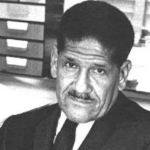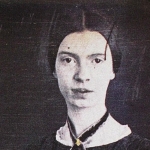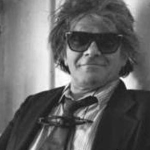This Earth the king said
Looking at the ground;
This England. But we drive
A Sunday paradise
Of parkway, trees flow into trees and the grass
Like water by the very asphalt crown
And summit of things
In the flow of traffic
The family cars, in the dim
Sound of the living
The noise of increase to which we owe
What we possess. We cannot reconcile ourselves.
No one is reconciled, tho we spring
From the ground together—
And we saw the seed,
The minuscule Sequoia seed
In the museum by the tremendous slab
Of the tree. And imagined the seed
In soil and the growth quickened
So that we saw the seed reach out, forcing
Earth thru itself into bark, wood, the green
Needles of a redwood until the tree
Stood in the room without soil—
How much of the earth's
Crust has lived
The seed’s violence!
The shock is metaphysical.
For the wood weathers. Drift wood
And the foot print in the forest grow older.
This is not our time, not what we mean, it is a time
Passing, the curl at the cutwater,
The enormous prow
Outside in the weather. In that breeze,
The sense of that passage,
Is desertion,
Betrayal, that we are not innocent
Of loneliness as Pierrot, Pierrette chattering
Unaware tho we imagine nothing
Beyond the streets of the living—
A sap in the limbs. Mary,
Mary, we turn to the children
As they will turn to the children
Wanting so much to have created happiness
As if a stem to the leaves—
—we had camped in scrub,
A scrub of the past, the fringes of towns
Neither towns nor forest, nothing ours. And Linda five,
Maybe six when the mare grazing
In the meadow came to her.
‘Horse,’ she said, whispering
By the roadside
With the cars passing. Little girl welcomed,
Learning welcome. The rest is—
Whatever—whatever—remote
Mechanics, endurance,
The piers of the city
In the sea. Here are whole buildings
Razed, whole blocks
Of a city gone
Among old streets
And the old boroughs, ourselves
Among these streets where Petra beat
A washpan out her window gathering
A crowd like a rescue. Relief,
As they said it, The Relief. Petra
Decisive suddenly among her children
In those crumbling bedrooms, Petra,
Petra—. And how imagine it? or imagine
Coughlin in the streets,
Pelley and the silver Shirts? The medieval sense seems innocent, the very
Ceremony of innocence that was drowned.
It was not. But how imagine it
Of streets boarded and vacant where no time will hatch
Now chairs and walls,
Floors, roofs, the joists and beams,
The woodwork, window sills
In sun in a great weight of brick.




















Comment form: